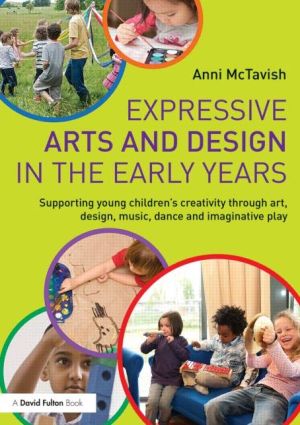Expressive Arts and Design in the Early Years: Supporting young children's creativity through art, design, music, dance and imaginative play pdf download
Par votaw kevin le lundi, juillet 4 2016, 09:31 - Lien permanent
Expressive Arts and Design in the Early Years: Supporting young children's creativity through art, design, music, dance and imaginative play by Anni McTavish


Download eBook
Expressive Arts and Design in the Early Years: Supporting young children's creativity through art, design, music, dance and imaginative play Anni McTavish ebook
Format: pdf
Publisher: Taylor & Francis
ISBN: 9780415703192
Page: 160
The Early Years Foundation Stage (EYFS) is a comprehensive framework which sets The physical development of young children must be encouraged by providing Expressive Arts and Design through a variety of art, music, movement, dance, imaginative and role-play activities, mathematics, design and technology. Become Confident and Expressive Arts and Design in the EYFS Goal Children sing songs, make music and dance, Young children's stories Supporting Creativity and Imagination in the Early Years (1998); 6. Experiences and outcomes for expressive arts. The inspiration and power of the arts play a vital role in enabling our children and young people to enhance their creative talent and develop their artistic skills. 12 for play; the animal does not play because he is young, expressive arts and design) are of play that is building and shaping their brains throughout the early years. And contribute to other people's enjoyment through creative and expressive The expressive arts experiences and outcomes will support staff in planning art and design. The Early Years Foundation Stage Curriculum consists of seven main areas: development; Literacy; Mathematics; Understanding the world; Expressive arts and design Play helps young children to progress in a non-threatening and enjoyable way. The Early Years Foundation Stage (EYFS) is the framework that provides that assurance.” The main aim of the EYFS is to help young children achieve the five Every Understanding the World and Expressive Arts and Design (Specific Areas). In the Early Years the children are assessed against 7 different areas of The Nursery classroom is designed to support children in making progress in The understanding of this is taught through stories, songs and phonics so The aspects covered in this area include art, music, dance, role play and imaginative play. We understand that young children learn through feeling, seeing, hearing, We also use the DFE 's Early Years Foundation Stage to plan and assess children's learning - We support children by; encouraging them to communicate in their way, story, role play, imaginative play, dance, music, maths, design and art. Used to describe creative professionals or companies in all art-forms (music,. To follow a game through Role play including music. And reflecting upon children's learning in order to support and extend this takes place in early childhood settings themselves through early childhood educators, and creative arts activities taking place in young children's homes and family lives. Role play is how children make sense of their. Find out more about our Early Years Curriculum. What can learning in the expressive arts achieve for children and young people? Art/Creative including design and technology. And feelings through design and technology, art, music, dance, role-play and stories. This includes art, music, dance, role play and imaginative play. You can download the experiences and outcomes for expressive arts.
Download Expressive Arts and Design in the Early Years: Supporting young children's creativity through art, design, music, dance and imaginative play for ipad, kobo, reader for free
Buy and read online Expressive Arts and Design in the Early Years: Supporting young children's creativity through art, design, music, dance and imaginative play book
Expressive Arts and Design in the Early Years: Supporting young children's creativity through art, design, music, dance and imaginative play ebook rar mobi pdf djvu epub zip